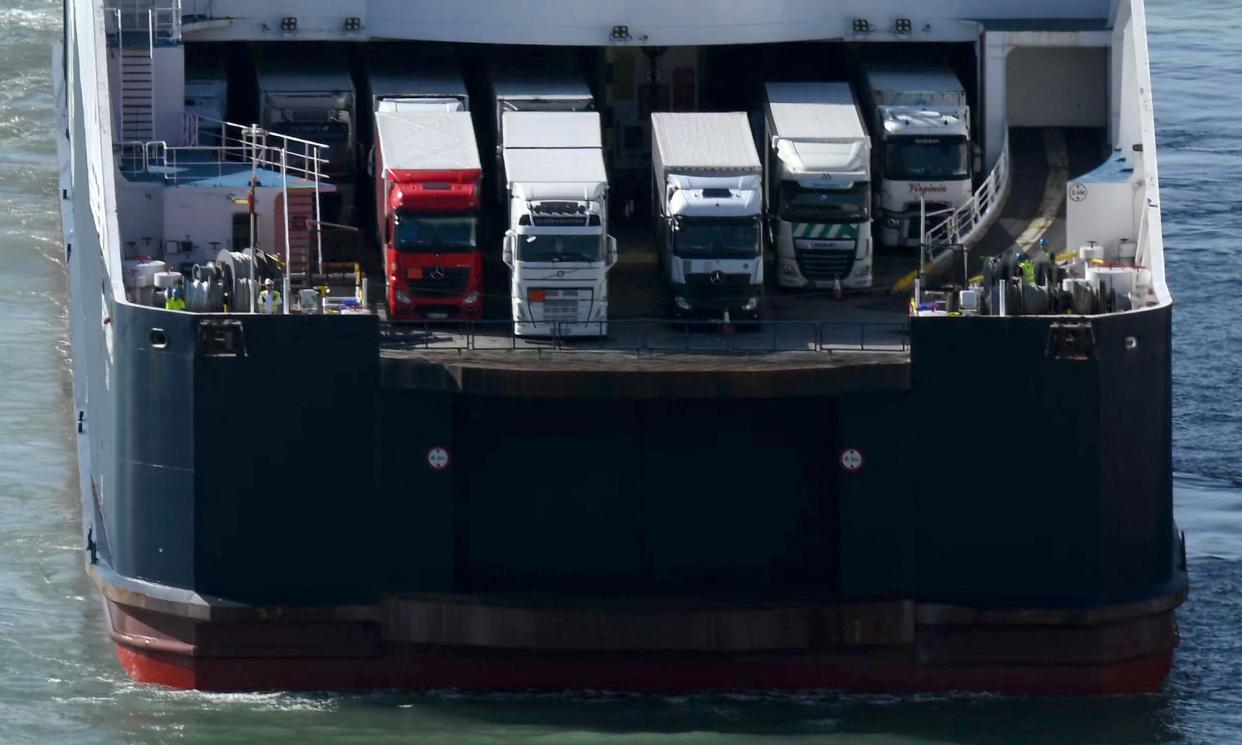New Brexit checks to cost UK business £2bn and fuel inflation, report finds

New post-Brexit UK border controls coming into force later this month will cost British businesses £2bn and fuel higher inflation, according to a report warning that UK-EU trade will be damaged as a result.
With less than a month before the introduction of new checks on animal and plant products from 30 April, the insurer Allianz Trade said the controls agreed under Boris Johnson’s Brexit deal could add 10% to import costs over the first year.
Ministers last week revealed that businesses could be charged up to £145 for each consignment imported through Dover, prompting warnings that this would drive up food prices and disproportionately hurt small businesses.
The Allianz report said that the checks, part of the government’s “border target operating model” (Btom), would affect £21bn of agricultural product imports, including eggs, live trees and plants, meat and fish, covering about 3% of all UK imports.
These new costs were the equivalent to adding a 10% tariff on these imports, it said, with Allianz indicating that EU companies would be likely to pass on these costs to UK customers.
It said these items accounted for about 6% of the overall basket of goods used to calculate the UK’s headline inflation rate, and that the additional costs could add 0.2 percentage points to inflation, with dairy, meat and fish most affected.
Inflation has fallen back from over 10% last year to 3.4%, helped by cooling food prices after the sharpest annual increase since the late 1970s. However, food prices are still 30% higher than three years ago.
Last October, the government estimated that the additional checks would cost businesses an extra £330m a year, and add less than 0.2 percentage points to headline inflation over three years.
The Allianz report found the inflationary pressures from the new checks would be tempered by a two-year suspension of tariffs on goods not covered by free trade agreements, which would cut import costs by £7bn. This included some agricultural products but also cars, fuels, metals and other non-food goods.
The report said that because these products represented 45% of total UK imports, it would have the effect of reducing overall inflation by 0.6 percentage points over the next year.
Responding to the Allianz report, Phil Pluck, the chief executive of the Cold Chain Federation, said that even before it was implemented it was “becoming evident that the Btom model was broken”. He said: “Without listening to the experts, the government will seriously damage business confidence in the UK and add costs to a consumer’s weekly shop.”
The report comes as British firms also face the prospect of tougher barriers to exporting to the EU as the UK steadily falls behind the introduction of new rules set by Brussels.
A separate study by UK in a Changing Europe, an academic thinktank, said UK companies would have “little choice” but to follow new EU standards currently being pushed through the Strasbourg parliament before elections in June.
It said the EU was going into “legislative overdrive” to complete reforms before the summer, while the UK government’s agenda had “all but dried up” as the general election loomed.
Warning a gulf was opening up between UK and EU rules on supply chains, digital competition and environmental standards, it said many of the changes would “de facto apply in the UK” for British firms looking to sell goods and services in the EU single market.
Joël Reland, a research associate at UK in a Changing Europe, said: “The UK is living next door to a regulatory behemoth, which it cannot afford to ignore. Even after Brexit, the EU remains the UK’s chief export market, so British businesses have little choice but to conform with new EU regulations.
“The main difference is that now the UK government has no means of influencing EU policy decisions from the inside.”
A government spokesperson said: “We do not recognise these figures. These checks will have a minimal impact on food prices and consumers, while saving traders and businesses around £520m each year compared to the model originally proposed.
“Our border checks are fundamental to protecting the UK’s food supply chain, farmers and natural environment against costly diseases reaching our shores.”


